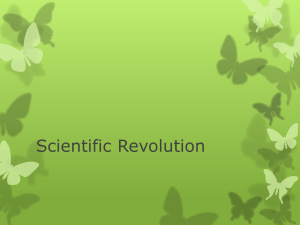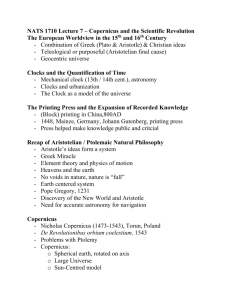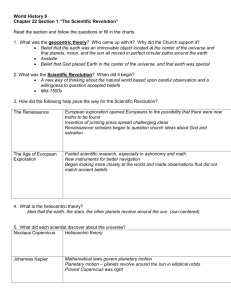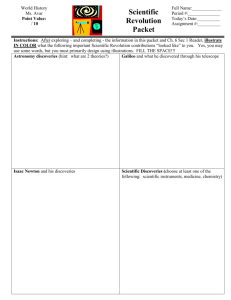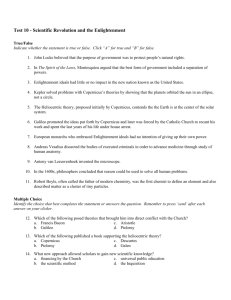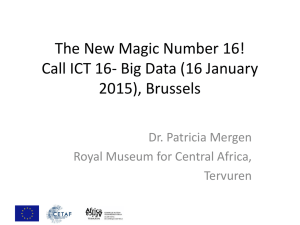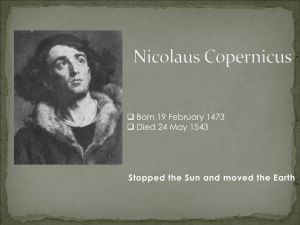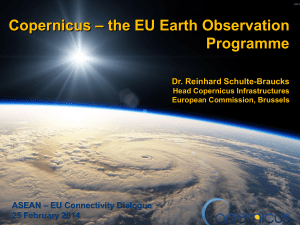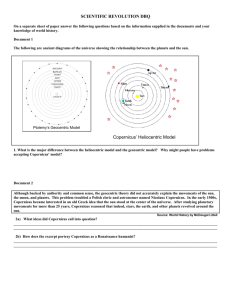The virtue of Innovation Systems Analysis for policy makers and
advertisement
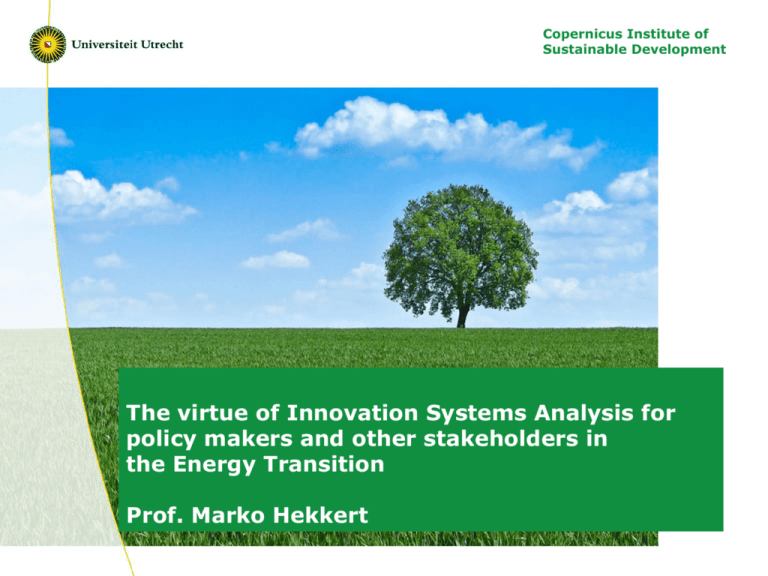
Copernicus Institute of Sustainable Development The virtue of Innovation Systems Analysis for policy makers and other stakeholders in the Energy Transition Prof. Marko Hekkert Copernicus Institute of Sustainable Development Who is talking? • Prof of Dynamics of Innovation Systems • Head of Innovation Studies (35 fte) • Part of Copernicus Institute (120 (fte) • Part of Utrecht University Copernicus Institute of Sustainable Development Copernicus Institute of Sustainable Development Copernicus Institute of Sustainable Development This talk • Overview of what we have been doing in this field • Focus on science – policy interaction using the TIS approach Copernicus Institute of Sustainable Development Long history in TIS research • Why? Interested in emergence of new technologies Innovation is a collective activity Technology characteristics, actors + institutional settings all matter (structure) Technological fields differ Leads to policy relevant outcomes – problem oriented Shift from structure to processes Copernicus Institute of Sustainable Development Quick tour through a Technological Innovation System analysis PV as casus Copernicus Institute of Sustainable Development Government, policy, institutions Research educatio n industry market Supportive infrastructure (banks, innovation support offices, lobby organizations) Copernicus Institute of Sustainable Development Diffusion Wafer based Thin Film Pre-development Development Functioning prototype? Stabilisation accelleration Take-off Commercial application? Fast Market growth? Market saturation? Copernicus Institute of Sustainable Development 140 120 Aantal actoren 100 80 60 40 20 0 Industrie Adviesbusiness Pub. onderzoek & Univ. HBO Financiele instelling Intermediairen Electric.leverancier Vereniging, Vervoerder Overig/Totaal 47 23 5 5 6 8 4 7 Beiden 24 4 Alleen Dunne-laag 15 8 Alleen Wafer-gebaseerd 43 0 Copernicus Institute of Sustainable Development 60.0 50.0 Aantal 40.0 30.0 20.0 10.0 0.0 PV comp. Handel en installatie Onder-houd Recycling 1.9 9.0 12.4 0.3 0.2 5.0 13.4 43.4 0.5 0.8 Grondstof Machines Cel Module Aantal Dunne-laag 1.5 7.0 5.0 Aantal Wafer 1.0 7.5 7.1 Copernicus Institute of Sustainable Development 100% 80% 60% GaAs (dunne-laag) Cu(In,Ga)Se (dunne-laag) Amorf Silicium (dunne-laag) Poly-kristallijn (wafer) 40% Mono-kristallijn (wafer) 20% 0% Celproductie Module / inpassing Machines Copernicus Institute of Sustainable Development Copernicus Institute of Sustainable Development Network 2006 vs 2010 Copernicus Institute of Sustainable Development Copernicus Institute of Sustainable Development Key processes / functions of TIS F1 F2 F3 F4 F5 F6 F7 entrepreurial experimentation knowledge development knowledge exchange Guidance of the search Market formation resources mobilisation legitimacy creation Copernicus Institute of Sustainable Development ondernemersactiviteiten 5.0 4.0 legitimiteit kennisontwikkeling 3.0 2.0 1.0 0.0 vrijmaken van middelen kennisuitwisseling marktontwikkeling richting geven Copernicus Institute of Sustainable Development Copernicus Institute of Sustainable Development What have we done so far? • • • • • • 7 PhD students Mapping of the emergence and growth of many TIS E.g. Biofuels, wind, PV, CHP, gasification Framework article + testing of framework Review article: why does renewable energy diffuse so slowly? Developed process methodology Developed theory on dynamics of TIS: motors of innovation Copernicus Institute of Sustainable Development recently • Study of actors strategies within TIS: system building, institutional theory Role of incumbent actors in blocking TIS • Developed scheme of analysis for policy advice • Wieczorek, A.J., Hekkert, M.P. (2012). Systemic instruments for systemic innovation problems: A framework for policy makers and innovation scholars. Science and Public Policy, 39(1), pp. 74-87 Copernicus Institute of Sustainable Development Scheme of analysis Copernicus Institute of Sustainable Development Policy discourse Neo-liberal innovation policies • Generic innovation subsidies Help to overcome market failure Innovation department of Economic Affairs Innovation policies in specific domains • Energy, Transport, Water Goal oriented Much more specific policy intervention • Specific R&D programs, launching customer, demonstration projects Copernicus Institute of Sustainable Development Goal oriented policies • • Were in need of a guiding framework Many different stakeholders What is good policy when effects show up much later? They stumbled upon the TIS framework Copernicus Institute of Sustainable Development Why do they like TIS? • • • Innovation process is complex but framework is simple Right language: system failure, motors not running, fixing, intervention Backed up by science – legitimate Copernicus Institute of Sustainable Development 2008 First TIS policy project Quick scan of 20 TIS related to the energy transition • Based on stakeholder workshops • Close cooperation with NEA • What factors are blocking the development of the TIS to the next phase? product life cycle perspective • • 500 million euro + 3,5 billion in matching from industry Copernicus Institute of Sustainable Development 2010 End of energy transition New government More liberal policy Transition policy had to go Focus on national strengths Top sector policy • Energy as top sector • No more interest in TIS • • • • Copernicus Institute of Sustainable Development TIS survived NEA had to monitor the energy transition program • The decided to collect data based on TIS framework All projects All actors Actor networks Goals of the projects Project results • Copernicus Institute of Sustainable Development Training of NEA • • • Help by designing structure of database Train employees to understand the concepts and the usefulness Increase legitimacy in top of organization by giving presentations, attending strategy meetings etc Copernicus Institute of Sustainable Development Functioning of the Dutch Energy System - Actors The right actors? International reputation? Role in value chain? Regional clusters? Source: Public-Private financed project plans of RVO.NL, NOW and Knowledge Institutions Enough Private Resources? % SME? Copernicus Institute of Sustainable Development Functioning of the Dutch Energy System – Collaboration Building up an innovation system? Do we see changes in network characteristics? For example: Network of BBE in 2012 and 2013 Source: Public-Private financed project plans of RVO.NL, NOW and Knowledge Institutions Copernicus Institute of Sustainable Development Functioning of the Dutch Energy System - Technology Enough variation? Increase in Technology Readiness? Marketshare Accumulation in products? Stabilisatio n Acceleratio n Business case? Take-off Pre-development Stakeholders Concepts Suppliers Components Owners Products Customers Applience Tim e Source: Public-Private financed project plans of RVO.NL Copernicus Institute of Sustainable Development Innovation Sensor A Dashboard for Portfolio Management Helping the TopTeam to decide on…. Doing the right things? Based on expectations of plan Bureaus and experts Doing the things right? Based on facts and figures from projects Review the functioning 3 of the 4 Decide on structure less/more Resources for Programs 5 Staf the Programs 6 Execute the Programs 1 Identify potential value networks 2 2 Prioritize the most actractive value networks Analyze the functioning 1 Map the innovation structure 6Execute and monitor the Programs 3 Optimize the portfolio of Innovation Programs 5 Staf the Programs 4 Select the Innovation Prrograms ….institutional change to empower the new economy Copernicus Institute of Sustainable Development Final result • • • TIS is now firmly embedded in Dutch energy policy domain….. …. as monitoring tool / framework Tool to make sense of a lot of data • Not only energy: also water, transport, agriculture • Policy makers may not understand the framework but work with the outcome • International expansion Copernicus Institute of Sustainable Development Copernicus Institute of Sustainable Development
